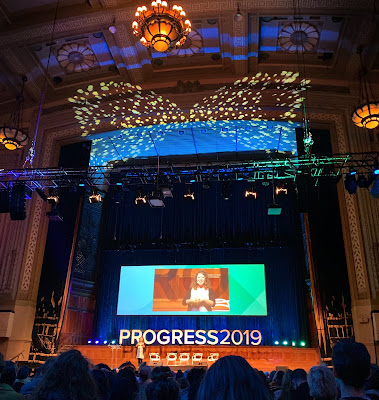Attending day one of Progress2019 reinforced for me the importance of self-identity, consciousness and culture in addressing the range of interconnected complex national and global issues that we face.
Too often we focus on the behaviours of others or on outdated systems. We point the finger instead of listening more deeply to self and those who think or feel differently. We often operate within our own silos and debate within echo chambers.
We often think and do as we always have done and risk developing solutions within previous mindsets that only perpetuate the problems we are attempting to solve.
‘Integral thinking or frameworks’ add new lenses to our view of complex issues. In addition to systems and behaviours they consider psychological and cultural perspectives.
In ‘How Culture Shapes the Climate Change Debate’ Andrew Hoffman states “social debate around climate change is no longer about carbon dioxide and climate models. It is about values, culture, worldviews and ideology.”
In describing effective communication and policy-making for climate solutions Annick De Witt and Nicholas Hedlund recognise “the critically important phenomenon of worldviews in the urgently needed transformation to sustainable societies.”
An ‘integral framework’ maps four essential terrains for successfully addressing complex issues. The following brief sketch of these terrains was adapted from Integral Environmental Sustainability.
In ‘How Culture Shapes the Climate Change Debate’ Andrew Hoffman states “social debate around climate change is no longer about carbon dioxide and climate models. It is about values, culture, worldviews and ideology.”
In describing effective communication and policy-making for climate solutions Annick De Witt and Nicholas Hedlund recognise “the critically important phenomenon of worldviews in the urgently needed transformation to sustainable societies.”
An ‘integral framework’ maps four essential terrains for successfully addressing complex issues. The following brief sketch of these terrains was adapted from Integral Environmental Sustainability.
🔹 Psychological Terrain - Self and Consciousness
Contexts: Self-identity and consciousness, intentions, personal values, mindsets, religious and spiritual beliefs...
Transformational Tools: Self questioning, introspection, mindfulness, counselling, journaling, prayer, meditation, immersion in nature, vision quests...
🔹 Cultural Terrain - Culture and Worldviews
Contexts: Cultural appropriateness, collective perceptions, collective vision, collective interpretation of inequalities...
Transformational Tools: Dialogue, inclusive strategic planning, organisational learning, community visioning, storytelling.
🔹 Behavioural Terrain - Brain and Organism, Actions
Contexts: Brain chemistry, physical health, behaviours, skills, capabilities...
Transformational Tools: Diet, hygiene, medication, skill building, guidance from a respected authority...
🔹 Systems Terrain: Social Systems and Environments
Contexts: Visible societal structures, systems and modes of production, strategies, policies, natural systems...
Transformational Tools: Policy making, organised protest, systems and transformational thinking, complexity and chaos theories, natural resource restoration and management systems...
Worldviews Test


Annick De Witt offers a useful Worldviews Test to increase self-awareness of our own often unquestioned beliefs and assumptions.




